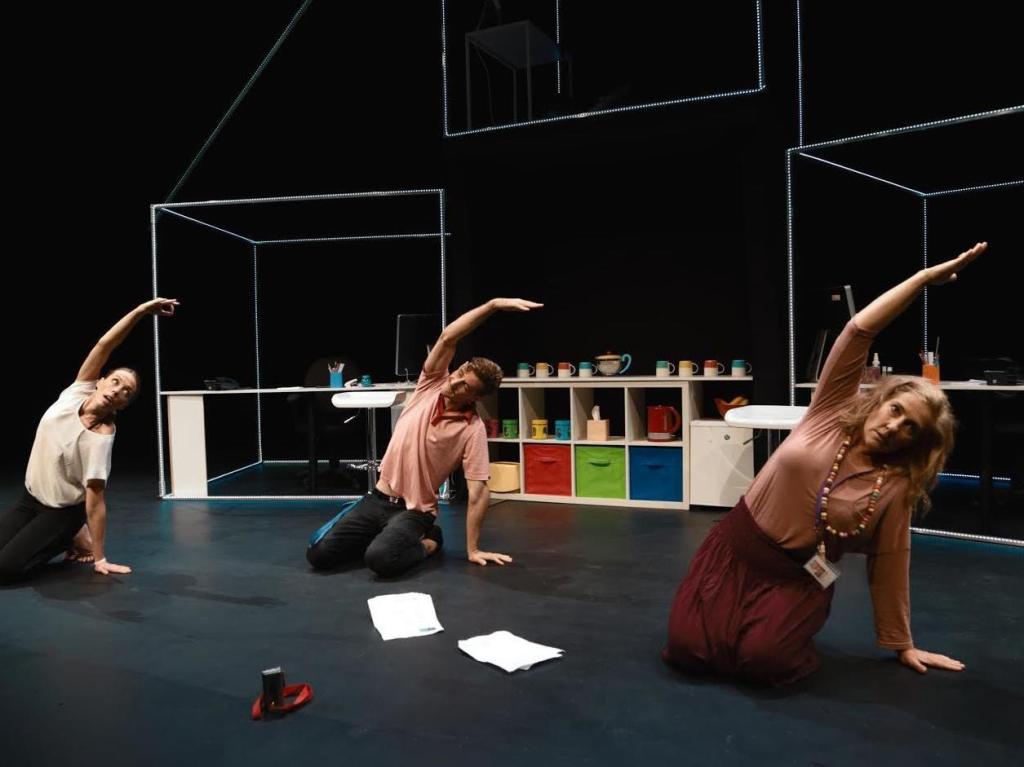I once worked at an institute of higher education where the atmosphere seemed comparatively benign, but greedy politicking always lay just underneath the surface. It produced colleagues who “oiled their way across the floor” at staff meetings, flattering those in the higher echelon of the bureaucracy whilst gently undermining their opponents with sarcasm and calumny. Earlier in my career, I worked in a small rural school, dominated by a schizophrenic headmaster who terrorised the staff daily with threats, humiliations and barked commands. Angela Murphy’s comedy, Stewed, takes place in the Shelbourne Harbour Institute of Tertiary Education (S(H)ITE), a place where acronyms reign supreme, an amalgam of the two bureaucracies mentioned above. This is a play about bullying and bureaucracy, written in a style perfectly suited to the preferred style of JUTE productions – energetic, unpredictable and sharp.
Constructed in two acts, with only three characters on stage, Stewed has been given a stylised, staccato presentation by its director, Peta Cook. It begins when Moondance, Acting Manager of The Operations and Equity Department (TOED), dedicated part-time worker and mother of twin girls, greets her co-worker, Clint. He is her very opposite – full-time, but still on probation, sloppy and manipulative. And that’s not all. He tells her a new boss is to be appointed, the svelte, super-efficient Branka, of Croatian extraction ̶ a young woman who insists in running staff meetings as if they were gym sessions. This is not the place to relate the details of the plot. Suffice it to say that things do not run smoothly hereafter. The three protagonists are so different that conflict is inevitable. They are bound to become antagonists, while we in the audience alternately squirm and laugh at the deceit and bullying, making guesses as to the outcome of it all. Cook’s direction is focussed and faithful to the three characterisations, nicely comparing and contrasting their physical and temperamental qualities, whilst never losing sight of the main game – namely the cruelty and inefficiency of bureaucracies.
The set designers, SimoneTesoriere and Simona Cosentini, have worked their magic once again, producing a minimalist set that startles all the time. Shaped like a child’s’ drawing of a house, triangular and broken into rooms downstairs, it represents the staff rooms and offices of the Department, with the Manager’s office in the upper level, those of the minions below. From time to time, strip lights outline the shape of the house and its rooms. This device provides a frenetic accompaniment to the Moondance music frequently heard in snatches:
And when you come my heart will be waiting
To make sure that you’re never alone
There and then all my dreams will come true, dear
There and then I will make you my own.
An enigma? Why is this song used as a motif throughout the play? The obvious response is that Moondance is a character’s name – but is that the only reason? No. There is a deeper reason and it is the job of the audience to wait for it to be revealed. Lighting Designer, Jason Glenwright, and Sound Designer, Andrew Furze, have jointly brought off a startling underscoring of the play’s themes.
Veronica Brady’s portrayal of Branka is absolutely in tune with the playwright’s intentions. She is young, svelte, and imbued with a sense of superiority. Entirely focussed on her managerial status, she fails to recognise genuine dedication becomes an easy target for flattery and insinuation. She has a lot to learn about managing people, which can be said about many bureaucrats who rise Parkinson-like, above their talents.
The flattery, of course, is provided by Clint (Brett Walsh), whose extremely busy portrayal of the time-serving office-worker is somewhat at odds with his character’s persona, but entirely in keeping with his insolent toadying. Some may have found his antics distracting, but I found them thought-provoking.
Finally, Sue Hayes, as Moondance, carried the play superbly, and in a series of modifications altered the audience perception of her character markedly as the play moved towards its climax. Initially, the passive do-gooder, following in her hippie parents’ footsteps, she becomes a victim of her colleagues’ slurs and smears; when she resolves to make the worm turn, she does so brilliantly, outperforming her detractors in every way. She dances all over them, in tune with the triumphant music and lighting of the dénouement.
JUTE has another hit on its hands, a play that sparkles and shines with wit and sophistication, with great one-liners, and intriguing characters. Don’t miss it.
Stewed
JUTE Theatre
Directed by Peta Cook
6 – 21 March, 2015





